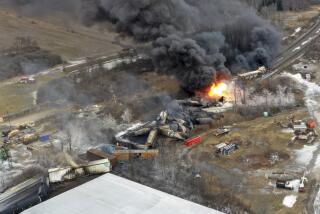A Terror Attack, Coming Soon to a Plant Near You
- Share via
George W. Bush likes to boast of his record on homeland security, but the truth is that corporate and political favoritism by the White House has badly compromised our capacity to defend ourselves against a terrorist attack.
For example, even as we searched, apparently fruitlessly, for weapons of mass destruction in Iraq, thousands of potential WMD -- our nation’s chemical and nuclear energy facilities -- have been left unguarded to please the president’s corporate friends and funders.
Of the nation’s 15,000 chemical plants, the Environmental Protection Agency has identified 123 where toxic gases released by a terrorist assault could kill or injure more than 1 million people, and 700 others where deaths and injuries would exceed 100,000. Yet a series of recent investigations by news organizations has found that most of these plants are effectively unguarded, even though the risks are beyond dispute and Al Qaeda’s interest in these targets is generously documented.
Seven weeks after 9/11, a GOP-controlled Senate committee unanimously passed a bill to require chemical plants to take steps to protect the public from terrorist attacks. But the White House, at the chemical industry’s behest, derailed the bill and then removed the EPA’s existing regulatory authority to require improvements in chemical plant security. Why would the Bush administration do this? All we know for sure is that President Bush and his party have accepted more than $22 million from the chemical industry since 1998.
The nuclear power industry, which gave $15 million to Bush and the GOP, also falls under the White House umbrella. A 2003 General Accounting Office report faulted the administration for failing to bolster nuclear plant defenses and found faulty security the rule at nuclear plants nationwide, despite myriad evidence that U.S. commercial nuclear reactors are high-priority terrorist targets. Astonishingly, federal law absolves nuclear power operators from protecting themselves against attack by enemies of the United States.
In order to be licensed, operators are required to protect their facilities from vandals. But both the GAO and industry reports acknowledge that the industry’s private security guards are undertrained, underequipped and demoralized. When the Nuclear Regulatory Commission stages mock assaults, the attackers are able to penetrate plant defenses in half their attempts and trigger simulated catastrophic radiation releases -- even though the defenders have advance notice of the exact time of the exercise and reinforce their defenses in anticipation. According to the GAO, the federal government deliberately stages “softball” mock attacks to give the impression of plant security and routinely shields the industry by burying significant security breaches.
Homeland Security Secretary Tom Ridge’s top aide, Al Martinez-Fonts, a former executive of JPMorgan Chase, recently explained why his department was reluctant to force the industry to adopt security reforms beyond voluntary programs, which Ridge himself admits don’t work.
“I was in the private sector all my life,” explained Martinez-Fonts. “Did I like it when the government came in and stepped in and told [us] to do certain things? The answer’s no.... I think we’re trying to avoid that.”
Applying this philosophy broadly, the White House, at the behest of the airline industry and air cargo carriers, has opposed a bill by Rep. Edward J. Markey (D-Mass.) to require that all commercial cargo placed on passenger planes be physically screened, just like luggage. Only about 5% of air cargo is now screened. Airline passengers are often sitting only inches above cargo that has not been checked, despite a Transportation Security Administration estimate in 2002 that there is a 35% to 65% chance that terrorists are planning to place a bomb in the cargo of a U.S. passenger plane.
The administration’s record on port security is equally dismal. Only 1% of the 10 million cargo containers entering American ports each year are ever checked, yet the administration has opposed bipartisan legislation creating a cargo-container profiling plan that focuses on inspections of high-risk cargo.
Tiptoeing around other big contributors, the White House has done nothing to secure railroad and transit networks or protect oil and gas pipelines. Two billion dollars in annual federal anti-terror grants to the states has been distributed more on the basis of pork than on need.
Martinez-Font’s idea that industry will step up to the plate on its own is pure folly. In July 2003, the Conference Board, a business research group, found that American corporations had hiked security expenditures less than 4% on average since the Sept. 11 attacks.
While asking sacrifice of young soldiers and future generations who will pay his giant deficits, Bush has been reluctant to curtail corporate profits or prerogatives or to ask sacrifice of political pals or the large donors who helped put him in office.
More to Read
Get the L.A. Times Politics newsletter
Deeply reported insights into legislation, politics and policy from Sacramento, Washington and beyond. In your inbox twice per week.
You may occasionally receive promotional content from the Los Angeles Times.










